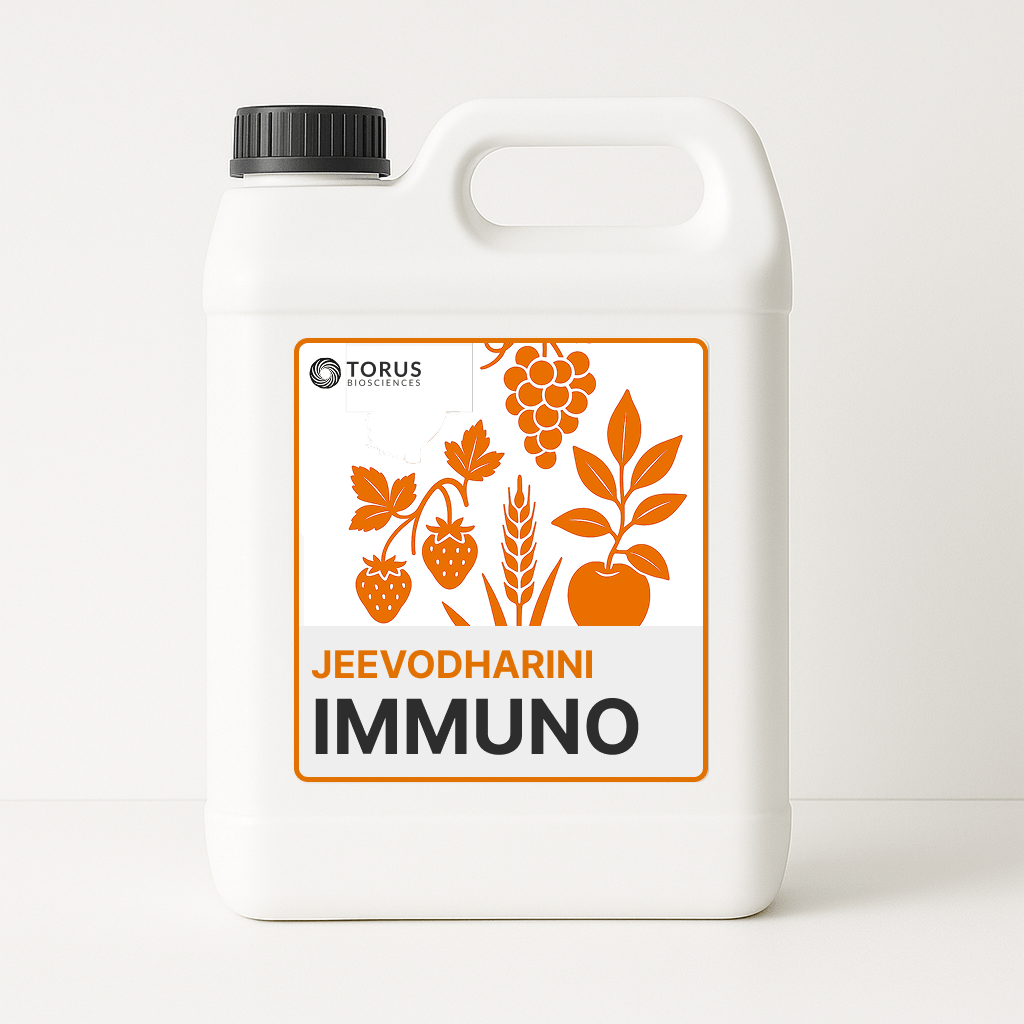
Jeevodharini Immuno
A specialized microbial consortium that enhances plant disease resistance and activates systemic defense responses.

Jeevodharini Immuno functions as a biological plant protectant through specialised microorganisms. These rhizobacteria produce antibiotics, siderophores, hydrolytic enzymes, and volatile organic compounds that suppress pathogens while triggering induced systemic resistance (ISR) in the host plant.
Unlike chemical fungicides, Immuno establishes a protective microbial community in the rhizosphere while priming plants to rapidly activate defense genes upon pathogen challenge. Field trials demonstrate significant disease reduction with efficacy comparable to conventional fungicides but with improved ecological compatibility and no residue concerns.
Benefits
-
Comprehensive Disease Suppression: Provides biological control through multiple mechanisms (antibiosis, competition, induced resistance), creating a layered defense system. Field trials consistently show 45-70% disease reduction across various crops and pathogen systems. Combined application of both bacteria provides broader spectrum protection than either organism alone.
-
Effective Soil-borne Disease Management: Suppresses diverse soil-borne pathogens including Fusarium, Pythium, Rhizoctonia, Sclerotium, and Phytophthora species. Tomato field trials documented 65% reduction in Fusarium wilt incidence through competitive exclusion and antibiosis.
-
Systemic Resistance Induction: Triggers plant’s intrinsic defense pathways, enhancing response against both root and foliar pathogens. Treated plants show increased production of defense enzymes including peroxidase, polyphenol oxidase, and phenylalanine ammonia-lyase, providing whole-plant protection through metabolic priming.
-
Persistent Rhizosphere Protection: The bacteria rapidly colonize root surfaces and surrounding soil, providing stable protection. Fluorescent-tagged bacterial tracking confirms rhizosphere persistence for 60-90 days after a single application, substantially longer than many chemical fungicides.
-
Sustainable Plant Protection: Reduces dependency on chemical pesticides, minimizing environmental impact and slowing fungicide resistance development. Aligns with organic agricultural standards and supports export-oriented production with no chemical residue concerns.
-
Abiotic Stress Mitigation: Treated plants show enhanced tolerance to environmental stresses including drought and salinity through bacterial production of osmoprotectants and plant growth regulators that maintain physiological functions under stress.
-
Environmental Compatibility: Extensively tested for ecotoxicological impact with no adverse effects on beneficial soil fauna, arthropods, or non-target microorganisms. Certified safe for humans, animals, and the environment by multiple regulatory agencies.
Suitable Crops
-
Vegetables: Particularly effective in solanaceous crops with up to 70% reduction in Fusarium and bacterial wilt. Controls damping-off and vine decline in cucurbits and suppresses black rot and downy mildew in cruciferous vegetables. Commercial tomato production shows 22-31% yield increases primarily through disease suppression.
-
Cereals and Millets: Provides protection against seedling diseases in rice (blast, sheath blight) and wheat (root rot, Karnal bunt). Rice nursery trials show 40-55% reduction in seedling mortality with more uniform crop establishment.
-
Pulses and Oilseeds: Exceptional efficacy in leguminous crops against collar rot, stem rot, and Fusarium wilt. Groundnut field trials document 35-50% reduction in collar rot and 15-25% yield enhancement.
-
Plantation Crops: Provides long-term protection in perennial systems, particularly against Fusarium wilt in banana, quick wilt in black pepper, and Phytophthora infections in citrus. Banana trials show 60% reduction in Panama disease over three growing seasons.
-
Nursery Production: Valuable for managing damping-off in vegetable, flower, and tree seedling production. Treated seedlings show 30-45% higher survival rates and faster establishment after transplanting.
Disease Management Capability
-
Damping-off and Seedling Diseases: Controls pre- and post-emergence damping-off caused by Pythium, Rhizoctonia, and Fusarium. The beneficial microbes produce compounds that disrupt fungal cell membranes while competing for infection sites. Nursery trials show up to 85% reduction in seedling mortality.
-
Root and Collar Rot Diseases: Prevents rot diseases caused by Macrophomina, Sclerotium, and Rhizoctonia across diverse crops. The microbial consortium produces hydrogen cyanide and specialized antibiotics that directly inhibit these pathogens while inducing root lignification. Legume crop trials show 55-70% reduction in root rot severity.
-
Vascular Wilt Diseases: Protects against fungal wilts (Fusarium, Verticillium) and bacterial wilts (Ralstonia solanacearum). Beneficial bacteria form protective biofilms on roots that prevent pathogen entry into vascular tissue. Commercial tomato studies show 65% lower wilt incidence and 28% higher marketable yields.
-
Foliar Disease Suppression: Reduces severity of foliar diseases including blights, mildews, and leaf spots through induced systemic resistance. The consortium activates jasmonate and ethylene pathways that prime plants to respond rapidly to infection. Studies show 30-45% reduction in foliar disease severity.
-
Post-harvest Disease Reduction: Pre-harvest application reduces post-harvest losses by inducing systemic resistance against storage pathogens including Alternaria, Colletotrichum, and Botrytis. Treated crops show 25-40% extended shelf life and reduced decay.
For optimal efficacy, apply Jeevodharini Immuno preventively as a seed treatment, soil drench during transplanting, or via irrigation systems early in the crop cycle. Works synergistically with Growth (for enhanced nutrition) and Root Enhance (for improved root development).
Key Microorganisms
Our proprietary microbial consortium combines carefully selected beneficial rhizobacteria with complementary functions. These include gram-negative bacteria that produce antimicrobial compounds, specialized antibiotics, and hydrogen cyanide that directly suppress pathogens while secreting siderophores that sequester iron from pathogens. The consortium also contains endospore-forming bacteria that produce antifungal lipopeptides (surfactins, iturins, fengycins) disrupting pathogen cell membranes and triggering plant defense pathways. This balanced combination ensures exceptional rhizosphere colonization, reliable performance under challenging conditions, and extended viability during storage.
Mechanism of Action
-
Antibiosis: The microbial consortium produces specialized antibiotics that directly inhibit pathogen growth by disrupting essential cellular processes.
-
Lipopeptide Production: Beneficial bacteria synthesize cyclic lipopeptides that insert into and disrupt pathogen cell membranes. These compounds exhibit remarkable stability in soil and maintain effectiveness under variable pH conditions. They bind specifically to fungal membrane components, explaining their selective toxicity.
-
Competitive Exclusion: The beneficial microbes rapidly colonize the rhizosphere and root surfaces, forming dense biofilms that physically prevent pathogen attachment. They efficiently utilize root exudates and compete for essential nutrients, creating an unfavorable environment for pathogens. Microscopy confirms complete root colonization within 48-72 hours.
-
Siderophore Production: The consortium produces iron-chelating siderophores that sequester environmental iron, creating iron-deficient conditions for pathogens while maintaining bacterial access through specific receptors.
-
Induced Systemic Resistance: The beneficial microbes trigger plant-wide defense responses through multiple signaling pathways. This includes activation of defense genes, production of antimicrobial phytoalexins, and strengthening of cell walls through enhanced callose and lignin deposition. Transcriptomic analyses identify hundreds of defense-related genes upregulated within hours of bacterial colonization.
-
Pathogen Virulence Suppression: The microbial consortium produces enzymes that degrade pathogen toxins and virulence factors, effectively neutralizing their pathogenicity before plant damage occurs.
Storage and Usage Instructions
For detailed application instructions, please refer to our Root Application Guide or Foliar Application Guide depending on your application method.
Available Variants




Boost productivity with our sustainable biological solutions.
Trusted by agricultural and waste management professionals for superior results.
Request pricing & availability